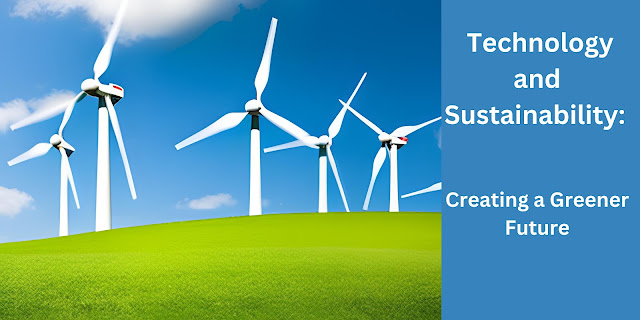Introduction
Environmental issues present in our world now put the planet's future in danger. It is crucial to prioritize sustainability to ensure a better tomorrow. Technology offers hope in this regard, as it has the potential to drive sustainable solutions. This article explores the fascinating connection between technology and sustainability, highlighting innovative ideas that can lead us towards a more environmentally friendly future.
Section 1: Technology's Impact on Sustainability
1.1 Understanding sustainability in our modern world
Sustainability means meeting our present needs while also preserving resources for future generations.It entails examining the environmental, social, and economic implications of our activities. Due to the consequences of climate change, pollution, and environmental deterioration, sustainability has become crucial today.
1.2 How technology can support sustainability
Technology has the power to reshape industries and bring about positive change. We have seen numerous examples of technology being used to tackle sustainability challenges. From renewable energy to waste management and more, technology is revolutionizing the way we approach sustainability.
Section 2: Sustainable Energy Solutions
2.1 Using renewable energy sources
Solar, wind, hydropower, and geothermal energy are all viable alternatives to fossil fuels.Solar power has made significant progress and is now a reliable and efficient option for generating energy. Wind energy has also grown rapidly, with large turbines harnessing the wind to produce electricity. Hydroelectric and geothermal energy use natural resources to create clean and renewable power.
2.2 Storing and distributing energy for a sustainable future
One challenge in adopting renewable energy is efficiently storing and distributing it. Advances in battery technology are making energy storage more reliable and cost-effective. Smart grid systems also play a vital role in optimizing energy distribution and promoting energy efficiency across the grid.
Section 3: Eco-Friendly Transportation and Mobility
3.1 Benefits of electric vehicles
Electric vehicles (EVs) are gaining popularity as sustainable transportation options. They produce zero emissions, reducing air pollution and greenhouse gases. With improvements in battery technology, EVs now have better range and charging capabilities, making them suitable for daily commutes and long-distance travel.
3.2 Sustainable public transportation systems
Sustainable public transportation is essential for reducing congestion and emissions. Electric buses and trains are being increasingly used, providing clean and efficient alternatives to traditional transportation. Technology integration in public transportation enables efficient route planning, ticketing, and real-time tracking, enhancing the overall passenger experience.
Section 4: Sustainable Agriculture and Food Production
4.1 Precision agriculture and its benefits
Precision agriculture uses sensors, drones, and data analytics to optimize farming practices. By gathering real-time data on soil moisture, temperature, and crop health, farmers can make informed decisions, reducing water usage, pesticide application, and fertilizer consumption. This approach leads to improved crop yields, minimized environmental impact, and enhanced resource efficiency.
4.2 Innovations in alternative food production
To sustainably meet the increasing demand for food, innovative methods like vertical farming and lab-grown meat have emerged. Vertical farming maximizes space by growing crops in vertically stacked layers, using less land, water, and pesticides compared to traditional farming. Lab-grown meat, produced by cultivating animal cells, has the potential to reduce the environmental impact associated with conventional livestock farming.
Section 5: Intelligent Cities and Sustainable Infrastructure
5.1 Building eco-friendly cities of the future
Intelligent cities combine technology and sustainable practices to create environmentally conscious and livable urban spaces. They prioritize energy efficiency, waste management, and the preservation of green areas. By incorporating smart technologies like IoT sensors and data analytics, cities can optimize resource allocation, reduce energy consumption, and improve the quality of life for residents.
5.2 Technology for effective resource management
Technology plays a crucial role in efficiently managing resources for sustainability. Waste management systems are adopting innovative approaches like recycling, composting, and converting waste to energy. Smart buildings equipped with energy-efficient systems and automated controls further contribute to resource conservation and environmental sustainability.
Conclusion
A more environmentally friendly future may be shaped by combining technology with sustainability.
By harnessing renewable energy, adopting sustainable transportation solutions, revolutionizing agriculture, and building intelligent cities, we can mitigate environmental challenges. Embracing these innovative solutions and supporting ongoing advancements will pave the way for a sustainable and prosperous future for generations to come.
Frequently Asked Questions (FAQs)
1. How does technology help address environmental challenges?
Technology offers innovative solutions for sustainable energy, transportation, agriculture, and infrastructure, helping reduce our environmental impact and tackle climate change.
2. What are some examples of sustainable energy solutions?
Examples include solar power, wind energy, hydroelectric power, and geothermal energy, all of which are renewable and have minimal environmental impact.
3. How do electric vehicles contribute to sustainability?
- Electric vehicles produce no emissions, reducing air pollution and greenhouse gases associated with traditional gasoline-powered vehicles.
4. What are the benefits of precision agriculture in sustainable food production?
Precision agriculture optimizes resource usage, reduces the need for chemicals, and improves crop yields, resulting in sustainable and efficient food production.
5. How can intelligent cities promote sustainability?
Intelligent cities use technology to optimize resource allocation, improve energy efficiency, and enhance waste management, creating sustainable and livable urban environments.
6. How can individuals contribute to a greener future through technology?
Individuals can adopt renewable energy sources, support electric vehicles, practice sustainable food production, and use smart technologies at home to reduce their environmental impact.
7. Are there any challenges associated with these technological innovations?
Some challenges include high initial costs, infrastructure requirements, and potential environmental impacts associated with certain technologies. However, ongoing advancements aim to address these challenges and improve the sustainability of these innovations.
